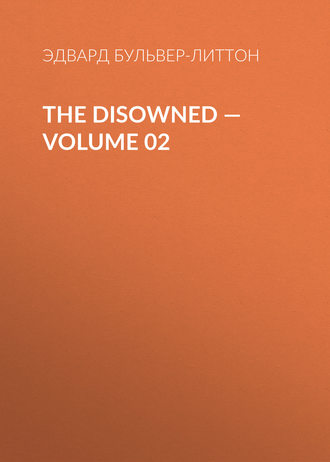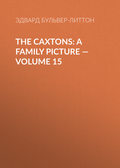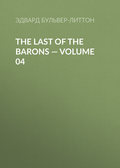
Эдвард Бульвер-Литтон
The Disowned — Volume 02
The poor and powerless Caroline Walden was therefore the last person for whom I had what the jargon of mothers term "serious intentions." However, I was struck with her exceeding loveliness and amused by the vivacity of her manners; moreover, my vanity was excited by the hope of distancing all my competitors for the smiles of the young beauty. Accordingly I laid myself out to please, and neglected none of those subtle and almost secret attentions which, of all flatteries, are the most delicate and successful; and I succeeded. Caroline loved me with all the earnestness and devotion which characterize the love of woman. It never occurred to her that I was only trifling with those affections which it seemed so ardently my intention to win. She knew that my fortune was large enough to dispense with the necessity of fortune with my wife, and in birth she would have equalled men of greater pretensions to myself; added to this, long adulation had made her sensible though not vain of her attractions, and she listened with a credulous ear to the insinuated flatteries I was so well accustomed to instil.
Never shall I forget—no, though I double my present years—the shock, the wildness of despair with which she first detected the selfishness of my homage; with which she saw that I had only mocked her trusting simplicity; and that while she had been lavishing the richest treasures of her heart before the burning altars of Love, my idol had been Vanity and my offerings deceit. She tore herself from the profanation of my grasp; she shrouded herself from my presence. All interviews with me were rejected; all my letters returned to me unopened; and though, in the repentance of my heart, I entreated, I urged her to accept vows that were no longer insincere, her pride became her punishment, as well as my own. In a moment of bitter and desperate feeling; she accepted the offers of another, and made the marriage bond a fatal and irrevocable barrier to our reconciliation and union.
Oh, how I now cursed my infatuation! how passionately I recalled the past! how coldly I turned from the hollow and false world, to whose service I had sacrificed my happiness, to muse and madden over the prospects I had destroyed and the loving and noble heart I had rejected! Alas! after all, what is so ungrateful as that world for which we renounce so much? Its votaries resemble the Gymnosophists of old, and while they profess to make their chief end pleasure, we can only learn that they expose themselves to every torture and every pain!
Lord Merton, the man whom Caroline now called husband, was among the wealthiest and most dissipated of his order; and two years after our separation I met once more with the victim of my unworthiness, blazing in "the full front" of courtly splendour, the leader of its gayeties and the cynosure of her followers. Intimate with the same society, we were perpetually cast together, and Caroline was proud of displaying the indifference towards me, which, if she felt not, she had at least learnt artfully to assume. This indifference was her ruin. The depths of my evil passion were again sounded and aroused, and I resolved yet to humble the pride and conquer the coldness which galled to the very quick the morbid acuteness of my self-love. I again attached myself to her train; I bowed myself to the very dust before her. What to me were her chilling reply and disdainful civilities?—- only still stronger excitements to persevere.
I spare you and myself the gradual progress of my schemes. A woman may recover her first passion, it is true; but then she must replace it with another. That other was denied to Caroline: she had not even children to engross her thoughts and to occupy her affections; and the gay world, which to many becomes an object, was to her only an escape.
Clarence, my triumph came! Lady Walden (who had never known our secret) invited me to her house: Caroline was there. In the same spot where we had so often stood before, and in which her earliest affections were insensibly breathed away, in that same spot I drew from her colourless and trembling lips the confession of her weakness, the restored and pervading power of my remembrance.
But Caroline was a proud and virtuous woman: even while her heart betrayed her, her mind resisted; and in the very avowal of her unconquered attachment, she renounced and discarded me forever. I was not an ungenerous though a vain man; but my generosity was wayward, tainted, and imperfect. I could have borne the separation; I could have severed myself from her; I could have flown to the uttermost parts of the earth; I could have hoarded there my secret yet unextinguished love, and never disturbed her quiet by a murmur: but then the fiat of separation must have come from me! My vanity could not bear that her lips should reject me, that my part was not to be the nobility of sacrifice, but the submission of resignation. However, my better feelings were aroused, and though I could not stifle I concealed my selfish repinings. We parted: she returned to town; I buried myself in the country; and, amidst the literary studies to which, though by fits and starts, I was passionately devoted, I endeavoured to forget my ominous and guilty love.
But I was then too closely bound to the world not to be perpetually reminded of its events. My retreat was thronged with occasional migrators from London; my books were mingled with the news and scandal of the day. All spoke to me of Lady Merton; not as I loved to picture her to myself, pale and sorrowful, and brooding over my image; but gay, dissipated, the dispenser of smiles, the prototype of joy. I contrasted this account of her with the melancholy and gloom of my own feelings, and I resented her seeming happiness as an insult to myself.
In this angry and fretful mood I returned to London. My empire was soon resumed; and now, Linden, comes the most sickening part of my confessions. Vanity is a growing and insatiable disease: what seems to its desires as wealth to-day, to-morrow it rejects as poverty. I was at first contented to know that I was beloved; by degrees, slow, yet sure, I desired that others should know it also. I longed to display my power over the celebrated and courted Lady Merton; and to put the last crown to my reputation and importance. The envy of others is the food of our own self-love. Oh, you know not, you dream not, of the galling mortifications to which a proud woman, whose love commands her pride, is subjected! I imposed upon Caroline the most humiliating, the most painful trials; I would allow her to see none but those I pleased; to go to no place where I withheld my consent; and I hesitated not to exert and testify my power over her affections, in proportion to the publicity of the opportunity.
Yet, with all this littleness, would you believe that I loved Caroline with the most ardent and engrossing passion? I have paused behind her, in order to kiss the ground she trod on; I have stayed whole nights beneath her window, to catch one glimpse of her passing form, even though I had spent hours of the daytime in her society; and, though my love burned and consumed me like a fire, I would not breathe a single wish against her innocence, or take advantage of my power to accomplish what I knew from her virtue and pride no atonement could possibly repay. Such are the inconsistencies of the heart, and such, while they prevent our perfection, redeem us from the utterness of vice! Never, even in my wildest days, was I blind to the glory of virtue, yet never, till my latest years, have I enjoyed the faculty to avail myself of my perception. I resembled the mole, which by Boyle is supposed to possess the idea of light, but to be unable to comprehend the objects on which it shines.
Among the varieties of my prevailing sin, was a weakness common enough to worldly men. While I ostentatiously played off the love I had excited I could not bear to show the love I felt. In our country, and perhaps, though in a less degree, in all other highly artificial states, enthusiasm or even feeling of any kind is ridiculous; and I could not endure the thought that my treasured and secret affections should be dragged from their retreat to be cavilled and carped at by—
"Every beardless, vain comparative."
This weakness brought on the catastrophe of my love; for, mark me, Clarence, it is through our weaknesses that our vices are punished! One night I went to a masquerade; and, while I was sitting in a remote corner, three of my acquaintances, whom I recognized, though they knew it not, approached and rallied me upon my romantic attachment to Lady Merton. One of them was a woman of a malicious and sarcastic wit; the other two were men whom I disliked, because their pretensions interfered with mine; they were diners-out and anecdote-mongers. Stung to the quick by their sarcasms and laughter, I replied in a train of mingled arrogance and jest; at last I spoke slightingly of the person in question; and these profane and false lips dared not only to disown the faintest love to that being who was more to me than all on earth, but even to speak of herself with ridicule and her affection with disdain.
In the midst of this, I turned and beheld, within hearing, a figure which I knew upon the moment. O Heaven! the burning shame and agony of that glance! It raised its mask—I saw that blanched cheek, and that trembling lip! I knew that the iron had indeed entered into her soul.
Clarence, I never beheld her again alive. Within a week from that time she was a corpse. She had borne much, suffered much, and murmured not; but this shock pressed too hard, came too home, and from the hand of him for whom she would have sacrificed all! I stood by her in death; I beheld my work; and I turned away, a wanderer and a pilgrim upon the face of the earth. Verily, I have had my reward.
The old man paused, in great emotion; and Clarence, who could offer him no consolation, did not break the silence. In a few minutes Talbot continued—
From that time the smile of woman was nothing to me: I seemed to grow old in a single day. Life lost to me all its objects. A dreary and desert blank stretched itself before me: the sounds of creation had only in my ears one voice; the past, the future, one image. I left my country for twenty years, and lived an idle and hopeless man in the various courts of the Continent.
At the age of fifty I returned to England; the wounds of the past had not disappeared, but they were scarred over; and I longed, like the rest of my species, to have an object in view. At that age, if we have seen much of mankind and possess the talents to profit by our knowledge, we must be one of two sects,—a politician or a philosopher. My time was not yet arrived for the latter, so I resolved to become the former; but this was denied me, for my vanity had assumed a different shape. It is true that I cared no longer for the reputation women can bestow; but I was eager for the applause of men, and I did not like the long labour necessary to attain it. I wished to make a short road to my object, and I eagerly followed every turn but the right one, in the hopes of its leading me sooner to my goal.
The great characteristic of a vain man in contradistinction to an ambitious man, his eternal obstacle to a high and honourable fame, is this: he requires for any expenditure of trouble too speedy a reward; he cannot wait for years, and climb, step by step, to a lofty object; whatever he attempts, he must seize at a single grasp. Added to this, he is incapable of an exclusive attention to one end; the universality of his cravings is not contented, unless it devours all; and thus he is perpetually doomed to fritter away his energies by grasping at the trifling baubles within his reach, and in gathering the worthless fruit which a single sun can mature.
This, then, was my fault, and the cause of my failure. I could not give myself up to finance, nor puzzle through the intricacies of commerce: even the common parliamentary drudgeries of constant attendance and late hours were insupportable to me; and so after two or three "splendid orations," as my friends termed them, I was satisfied with the puffs of the pamphleteers and closed my political career. I was now, then, the wit and the conversationalist. With my fluency of speech and variety of information, these were easy distinctions; and the popularity of a dinner-table or the approbation of a literary coterie consoled me for the more public and more durable applause I had resigned.
But even this gratification did not last long. I fell ill; and the friends who gathered round the wit fled from the valetudinarian. This disgusted me, and when I was sufficiently recovered I again returned to the Continent. But I had a fit of misanthropy and solitude upon me, and so it was not to courts and cities, the scenes of former gayeties, that I repaired; on the contrary, I hired a house by one of the most sequestered of the Swiss lakes, and, avoiding the living, I surrendered myself without interruption or control to commune with the dead. I surrounded myself with books and pored with a curious and searching eye into those works which treat particularly upon "man." My passions were over, my love of pleasure and society was dried up, and I had now no longer the obstacles which forbid us to be wise; I unlearned the precepts my manhood had acquired, and in my old age I commenced philosopher; Religion lent me her aid, and by her holy lamp my studies were conned and my hermitage illumined.
There are certain characters which in the world are evil, and in seclusion are good: Rousseau, whom I knew well, is one of them. These persons are of a morbid sensitiveness, which is perpetually galled by collision with others. In short, they are under the dominion of VANITY; and that vanity, never satisfied and always restless in the various competitions of society, produces "envy, hatred, malice, and all uncharitableness!" but, in solitude, the good and benevolent dispositions with which our self-love no longer interferes have room to expand and ripen without being cramped by opposing interests: this will account for many seeming discrepancies in character. There are also some men in whom old age supplies the place of solitude, and Rousseau's antagonist and mental antipodes, Voltaire, is of this order. The pert, the malignant, the arrogant, the lampooning author in his youth and manhood, has become in his old age the mild, the benevolent, and the venerable philosopher. Nothing is more absurd than to receive the characters of great men so implicitly upon the word of a biographer; and nothing can be less surprising than our eternal disputes upon individuals: for no man throughout life is the same being, and each season of our existence contradicts the characteristics of the last.
And now in my solitude and my old age, a new spirit entered within me: the game in which I had engaged so vehemently was over for me; and I joined to my experience as a player my coolness as a spectator; I no longer struggled with my species, and I began insensibly to love them. I established schools and founded charities; and, in secret but active services to mankind, I employed my exertions and lavished my desires.
From this amendment I date the peace of mind and elasticity which I now enjoy; and in my later years the happiness which I pursued in my youth and maturity so hotly, yet so ineffectually, has flown unsolicited to my breast.
About five years ago I came again to England, with the intention of breathing my last in the country which gave me birth. I retired to my family home; I endeavoured to divert myself in agricultural improvements, and my rental was consumed in speculation. This did not please me long: I sought society,—society in Yorkshire! You may imagine the result: I was out of my element; the mere distance from the metropolis, from all genial companionship, sickened me with a vague feeling of desertion and solitude; for the first time in my life I felt my age and my celibacy. Once more I returned to town, a complaint attacked my lungs, the physicians recommended the air of this neighbourhood, and I chose the residence I now inhabit. Without being exactly in London, I can command its advantages, and obtain society as a recreation without buying it by restraint. I am not fond of new faces nor any longer covetous of show; my old servant therefore contented me: for the future, I shall, however, to satisfy your fears, remove to a safer habitation, and obtain a more numerous guard. It is, at all events, a happiness to me that Fate, in casting me here and exposing me to something of danger, has raised up in you a friend for my old age, and selected from this great universe of strangers one being to convince my heart that it has not outlived affection. My tale is done; may you profit by its moral!
When Talbot said that our characters were undergoing a perpetual change he should have made this reservation,—the one ruling passion remains to the last; it may be modified, but it never departs; and it is these modifications which do, for the most part, shape out the channels of our change; or as Helvetius has beautifully expressed it, "we resemble those vessels which the waves still carry towards the south, when the north wind has ceased to blow;" but in our old age, this passion, having little to feed on, becomes sometimes dormant and inert, and then our good qualities rise, as it were from an incubus, and have their sway.
Yet these cases are not common, and Talbot was a remarkable instance, for he was a remarkable man. His mind had not slept while the age advanced, and thus it had swelled as it were from the bondage of its earlier passions and prejudices. But little did he think, in the blindness of self-delusion,—though it was so obvious to Clarence, that he could have smiled if he had not rather inclined to weep at the frailties of human nature,—little did he think that the vanity which had cost him so much remained "a monarch still," undeposed alike by his philosophy, his religion, or his remorse; and that, debarred by circumstances from all wider and more dangerous fields, it still lavished itself upon trifles unworthy of his powers and puerilities dishonouring his age. Folly is a courtesan whom we ourselves seek, whose favours we solicit at an enormous price, and who, like Lais, finds philosophers at her door scarcely less frequently than the rest of mankind!







